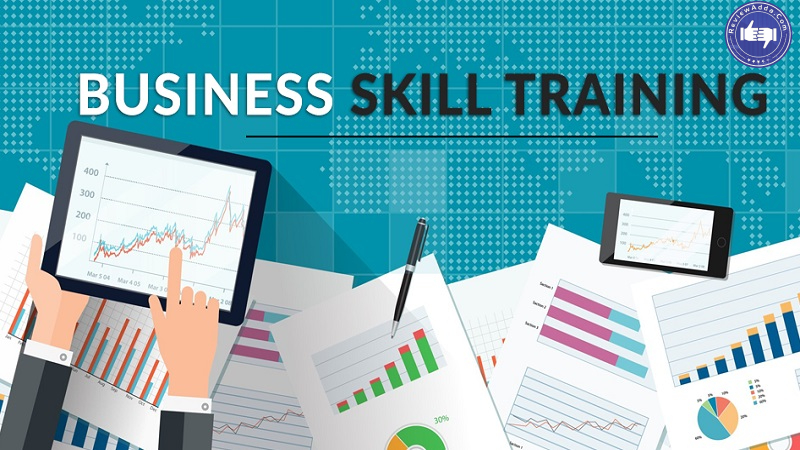Topic We Cover: Business skills Training courses
1. What are Business Skills
2. Specific examples of business skills
3. Why are business skills important
4. Categories For Business Skills
5. Online Courses and Programs in Business Skills
6. Business skills courses
7. How to improve business skills
8. How to highlight business skills
- Business skills for resume
- Business skills for cover letter
- Business skills for an interview
To improve your professional skills with the help of training designed to assist you develop your career and attain your goals. Courses in leadership, communication, and project management will guide you and your business toward success through Business Skills Training Courses.

What are Business Skills?
Business skills include all the communication skills, soft skills, project management, management skills, and technical skills required to be successful in business and Management Fields. The soft skills include problem solving, critical thinking, verbal communication, leadership skills, effective communications, time management, leadership, public speaking, presenting, decision making and more. On the technical side, a business role needs key analytics and computer skills as well as mathematics skills and experience with widely-used business software programs such as Word, Microsoft Excel, and Powerpoint just to name a few.
A good place to start is with soft skills, taking Courses in Time Management, communications, and leadership. Then move up into specialized people skills and technical skills as you decide your career path.
The requirements of many business skill will rely upon the area of specialization. For example, a staff management role will need skills in team building, interviewing, and conflict resolution. Financial management or Accounting roles will require advanced mathematics skills and knowledge of various types of software and accounting systems. Human resources will want to have productive soft skills to work with distant team members whether you are a small business, a new business, or a veteran enterprise. A business intelligence role will require data analysis, advanced statistics, and Data Science Skills.
Business skills are skills that assist people understand organizational and consumer behavior and to promote the success of the company they use this information. These skills are primarily substantial for company owners and managers, entrepreneurs, however, more and more employers seek for job candidates who acquire a combination of both technical and business skills.
Specific examples of business skills include:
- Time management skills
- Team-building skills
- Analytical skills
- Negotiation skills
- Problem-solving skills
- Sales and marketing skills
- Financial management skills
Business Skills will change between industry and company type. For example, a person working in the finance industry may be necessary to have business skills that include being able to produce analyze and financial reports the market. In management someone who works should be able to properly communicate and delegate with team members.
Why are business skills important?
The Fundamental Component of Business Skills are a starting, running and managing a successful business. If you are an owner of a business, these skills adorn you with the ability to meet the demands of both your employees and consumers. As a current or potential employee, business skills can set you separate from other workers and help you ahead in position within your career.
Additionally, your career or business can advantage from business skills by acknowledging you or your company to:
- High product quality should be maintain
- Build excellent customer relations and customer care standards
- Increase performance, productivity and profits through efficient planning, management and implementation of business aims and goals
- Form a sound financial base and maintain a prudent financial policy
- Maintain a positive and productive company culture
- Motivate employees to perform at their best
- Establish profitable sales and marketing channels
Categories For Business Skills
- Career Development
- Competency Development
- Engagement and Retention
- Human Resources
- Individual Contributor Course Bundles
- Management Leadership
- Manager Course Bundles
- Manager Toolkits
- Onboarding
- Personal Development
- Project Management
Online Courses and Programs in Business Skills
You can enroll in Online Courses from major universities and institutions around the world. Get essential business and technical skills training important for any business career before progressing into your desired business specialization.
Start with important Foundation Courses in Business teamwork, communication, and critical problem solving with professional programs. These courses teach you how to make presentations with a focus on understanding your audience and crafting tailored messages. Learn how to approach a business problem, research solutions and make informed decisions based on critical thinking and analysis.
The next area to study is leadership. Take courses in all-embracing leadership from Catalyst and explore the Advanced Business Leadership Program. The 5-course program teaches you how to lead high-performing teams in complex environments. Learn how to empower and motivate employees to succeed. Mastery of leadership techniques and tools will be a great addition to your business skillset.
An essential business skill that every employer will need to see is data and business analysis. Add courses in Advanced Data Analysis, data analytics, and Microsoft Excel to your online curriculum. Learning advanced data visualization techniques with Excel will make your resume stand out and solidify your path to a business management role.
Find additional Courses in Professional Writing, problem solving, accounting, data science and much more to build out a strong and impressive business skillset. Many courses are self-paced so you can enroll and initiate learning today.
Business skills courses
1. Business Analysis and Strategy
Boost your business impact by growing skills in Strategic Business Analysis, decision making, and critical thinking. Learn how to influence data to make better business decisions through crux concepts like storytelling with data and data analysis.
2. Business Tools and Software
Get excelling at the business software you use daily—or expert the tool to land your next job. Get training on SharePoint, Microsoft Excel, FileMaker, QuickBooks, Google Docs, and other top business software.
3. Career Development
Acquire information about How to Manage Your Career, from your early job search to moving forward in your career to change careers. Get the skills you require to increase your network, interview, write a resume, get a job, and get promoted.
4. Customer Service
Acquire information about customer service best practices, whether you're a manager, customer service professional, or work with customers in your career. Acquire skills in contact centers, communication, CRM software, and more.
5. Finance and Accounting
Enhance your accounting Skills for Small Business, professional accounting, or personal finance.
Business owners and those in management positions are often necessary to have financial mgmt. skills to effectively figure out and manage the company’s financial needs. Financial Management Skills include the power to examine and determine the current market, know investment advantages and risks, timely and effectively budget and recognize anything that is negatively impacting the company’s bottom line. In addition to business owners, positions that may need financial management skills include accountants, business analysts, and bank employees.
A good Understanding of Financial Management as a business skill, allows you to plan new projects and services – you’ll have a great understanding of what is selling well and how best to generate additional revenue.
Being able to effectively managing your finances is a critical for your business or department. You will require to be able to anticipate your cash flow and sales, as well as, watch carefully your profit and loss. Therefore you’ll want at least knowledge of balance sheets, profit and loss sheets, and basic bookkeeping.
Cash is the life of any business and profitable businesses fail and go out of control if they run out of cash and can't pay their employees or their suppliers. Supplies soon choke and they have nothing to sell and the employees leave and Find Different Employment.
Understand your company’s financial needs, as well as the intricacies of what the market is current demanding.
Improving your financial management
Analytic Thinking - to be skilled in Financial Management, you have to adept with critical and analytical thinking. Try to enclose yourself with publications, reviews, and general content related to finance.
Use the latest technology - gone are the days when Excel spreadsheets were the only way to analyse data – research the latest FinTech in your industry, the caveat is that you have to first understand how to use this technology which isn’t always trivial.
6. Human Resources
Acquire information about how to be an Effective HR Professional, whether specialist or generalist. Acquire needed skills in recruiting, talent management, hiring, compensation and benefits, L&D, HR strategy, employee relations, and more.
7. Communication
Both business owners and managers should be able to effectively communicate with employees, other managers, consumers and other individuals involved in day-to-day business operations. Effective Communication Skills include both verbal and written and should allow you to clearly communicate information in a way that is easily understandable.
Examples of communication skills include being able to:
- Effectively negotiate to mediate disputes
- Compose clear and concise emails
- Confidently speak in both one-on-one settings and large groups
- Keep communication open between yourself and employees
- Effectively relay the goals of a project and the steps required to complete it
Communication forms the basis of interaction in any workplace, it mediates the spread of ideas, innovation, and opinions. Communication helps you prepare loyal employees, charm customers into coming back time after time, find secure investment and new suppliers.
To communicate effectively, you’ll need to have a grasp on written, verbal, and non-verbal communication. Written communication can be tricky - whether it’s a short email or company memo, it can be easily misinterpreted as the conversation is less free-flowing – the key is being able to use the right words in the right context.
A Large Part of Communication is listening. Being in business means both as a leader and as a colleague, working with other people. Both roles need respect, humility, a civil attitude even under hardship, and respect. Try to listen partly as much as you talk.
Improving your communication skills, aside from allowing you to express your ideas and opinions more openly, develops your empathy by allowing you to understand the opinions of others.
The ability to construct an argument and make your case forcefully and clearly to your boss, client or co-workers will bring your ideas to fruition.
Develop your communication skills:
Learn to express yourself - You should be able to clearly articulate your thoughts, opinions, and ideas both in writing and orally. Get out of your comfort zone and speak up in meetings, ask questions at conferences, arrange to meet High Profile Influencers in Your Industry – these are great ways to force yourself to grow.
Enhance interaction skills - A perfect way to boost up your confidence for one on one engagements is by getting to understand your workplace colleagues and clients on a more personal level.
Listen more than you talk - In the words of Ernest Hemingway ‘when people talk, listen completely. Most people never listen.’ People love to hear their own voice and often disregard the opinion of the other person - if it’s just you talking, it’s a lecture, not a conversation.
Use available tools and services - attend seminars, Toastmasters, clubs, use virtual reality to practice, take an online course or listen to audiobooks - there are plenty of training tools and services out there to help improve Your Communication Skills.
8. Delegation
As a business owner or manager, you should be able to efficiently distribute work to individuals and teams depending on their power to act and proven strengths. Effective delegation means striking a balance between freedom and responsibility. Your employees and teams should be given adequate freedom to accomplish tasks, but also the responsibility and accountability of achieving desired results within deadlines.
In the context of a business, delegation entails transferring duties and tasks to colleagues. Ideally, this should be the long-term goal of every business personnel, reaching the stage where your business or team work for you and not the other way round.
Working alongside colleagues, or even managing people, doesn’t mean taking on all of the work yourself. In business, a spirit of collaboration advantageous to everyone, and part of collaboration is delegation. This means offering opportunities to other people to do work and grow.
No matter how educated and talented, one individual cannot do everything that requires to be done to keep an organization on track toward its goals. The ability to surround yourself with talented people, who can fill the gaps in your knowledge and expertise, will help complete projects of all types.
Delegation is also an Important Detail of Time Management. If you take everything on yourself, chances are your work in key areas will suffer. Someone who excels in business will be able to manage their own workload by appropriately delegating tasks and projects to colleagues and subordinates.
 Get Updated Review ( Voice Based Alumni Feeback)
Get Updated Review ( Voice Based Alumni Feeback)
-
 Check Review (Alumni Feedback) - Poornima University – Click Here
Check Review (Alumni Feedback) - Poornima University – Click Here -
 Check Review (Alumni Feedback) - JECRC Jaipur – Click Here
Check Review (Alumni Feedback) - JECRC Jaipur – Click Here -
 Check Review (Alumni Feedback) - KL University – Click Here
Check Review (Alumni Feedback) - KL University – Click Here -
 Check Review (Alumni Feedback) - Poornima University – Click Here
Check Review (Alumni Feedback) - Poornima University – Click Here -
 Check Review (Alumni Feedback) - Bennet University – Click Here
Check Review (Alumni Feedback) - Bennet University – Click Here
Learn how to delegate
Improve your communication – You cannot delegate effectively if your colleagues do not have a clear and concise understanding of what you want them to do.
Be a good mentor – Don’t just delegate because you want to pass on responsibilities, delegate because you want your colleagues to grow and improve.
Learn to trust others – You have to trust the capabilities of your colleagues to perform a giving task. Resist the urge to micromanage as this creates a sense of insecurity which ultimately leads to inefficiency.
9. Leadership and Management
Leadership is a skill not just for managers but for any role. Acquire information about how to become a more successful leader, make better decisions, Improve Communication, manage conflict, and lead others through times of change.
This is a key skill of any astute business person. As your business grows, you will likely need to hire people and be able to provide them with a vision and mission as well as concrete goals to achieve. Leadership is often strategic in nature and requires you to understand how to offer your employees and teams an actionable plan and the motivation to complete it. In addition to business owners, to maintain effective day-to-day operations, leadership skills are also required by those in management positions.
Leadership is the art of persuading and managing people with the aim of achieving set goals and objectives.
You must be able to motivate your staff in order to get the best out of them and improve productivity. Have regular assessments and progress meetings (at least every six months) to make sure your employees are happy – spend time listening to their issues and needs and do all you can to help them out. People work hardest when they're happiest.
If you intend to grow your team or business, you’ll need to hire more people – leadership skills play a big role in attracting the best talent and retaining them through tough times.
Experienced the boundary between employee and employer is crucial - you should be liked but not overly friendly, able to maintain authority but also encouraging, inspiring, and understanding.
Cultivate people to develop their own skills to help with retention within your team and business. Try to recognise people's strengths and use that to the Business' Advantage.
The best technique to run businesses is not only marketing led but have strong leaders at the helm who understand what's required to attain set goals.
Becoming an effective leader
Communicate – One of the fundamental pillars of leadership is effective communication. You cannot lead if your followers lack a basic understanding of your aims, and objectives. A good leader should be able to communicate his or her motives clearly with careful body language and diction.
Mentorship skills - Can you adequately mentor a colleague? If you’re unsure about your answer, you could undergo a mentorship program yourself and learn what works and what doesn’t from your own experience.
Sustainable relationships - Going the extra mile to initiate and maintain healthy relationships positively impacts the work environment, and is critical for workplace efficiency and productivity. A simple ‘hey, how are you doing’ or recalling seemingly trivial details is enough to develop a healthy relationship.
10. Marketing
Find your marketing slot, or learn it all— PR, branding, analytics, SEO, Social Media, and email marketing. Learn how to implement, develop, and measure a winning marketing strategy using today's best tools.
11.Team building and team management
Attaining a business goal often initiates with the ability to select and manage an efficient team. Knowing how to choose the most appropriate team, assign tasks and motivate your workers can result in your employees performing at peak levels. The better you are at team building and team management, the more able your team will be to perform as a friendly unit and work together towards a common cause.
12. Professional Development
Good business skills are crucial in any career. Learn about communication, time management, and emotional intelligence. Focus on what you want to do to be hone your creativity, more productive, or give a great presentation.
13. Project Management
Determine project management from these online video tutorials designed to help you tasks, manage schedules, and resources. Explore PRINCE2, Microsoft Project, Project Management Professional (PMP) topics, and more.
Projects in the workplace often have specific timelines, milestones, budgets and end goals. Project mgmt. skills allow you to effectively handle daily efforts as well as the overall progress of a project. Cost control and timely completion are two important aspects of Project Management Skills.
14. Sales
Determine how to be an effective sales professional, whether specialist or generalist. Acquire the needed skills in sales software, selling frameworks, managing a salesforce, and more.
15. Entrepreneurship and Small Business
Whether you're building a company or working as a freelancer, learn the skills you want to manage your business, sell your services and products, and Create a Business Strategy to help you accomplish your goals.
Innovation, ideas, calculated risks, and a creative mind. These traits have earned entrepreneurs fame and huge profits – they use to be only associated with start-ups – however it’s now common to find innovation departments within large corporations as they try to fend off start-ups and keep their competitive benefit.
Keep up to date with innovation and technology by reading a variety of sites and blogs - you’ll be able to identify competition early, plan new product lines and learn about acquisition targets.
Entrepreneurial blogs and sites to read
- Andrew Chen
- Gary Vaynerchuk
- On Startups
- Guy Kawasaki
- Entrepreneurs Journey
- Steve Blank
- Andreessen Horowitz
- Hacker News
- BBC Technology
Develop your entrepreneurial side
Be creative – listen to entrepreneurial podcasts, read biographies, attend innovation meetups, read about start-up accelerator teams.
Be a risk taker – it’s never too late to initiate familiarizing yourself with risk taking. The risk taking mentality is one that places emphasis on long-term goals – the big picture rather than short term achievements.
16. Negotiation skills
With time, you’ll learn what negotiation strategies work, what to say and how to say it, in order to get the best deals for your business. The better at negotiation you are, the more money you’ll save from suppliers, the more money you’ll raise form investors and the more you can charge customers, all allowing your business to grow.
Get into the habit of negotiating lower prices whenever you buy or order something in your day-to-day life, it will give you invaluable practice and help you understand which techniques work best for you. It'll show how you can almost always get something extra or cheaper if you just ask.
The best negotiation is done with a smile – it’s much more effective to charm your way to a good deal and get the other person to Want to do Business with you. Try to always be affable, even when you're being firm.
There’s no standard blueprint for negotiating, it’s a skill that takes time to master and each person has their own methods that work. To develop your negotiating skills, try to negotiate as often as possible, whether it be at a car boot sale or in a local shop.
17. Business networking
If you took a sample details of ten directors of a company and asked them how they managed to get to the top in the competitive corporate environment, there are very high chances that most of them will mention networking.
Business Networking is one of the low-cost ways of creating and converting sales opportunities and most efficient too. It will give you, your team or your business the necessary edge to succeed in the current marketplace.
Through networking building good relationships will also help you elevate the corporate ladder and get hired at leading companies in your industry.
Improve your professional networking:
Never underestimate social media – it’s an easy to way to connect after an event and liking the odd post or promotion on LinkedIn will keep you in their conscious.
Attend face to face events – this is the best way to connect with people, whether it be at a conference or a Meetup.com event. There are plenty of Networking Opportunities for you to build your network and expand your influence.
Build an online personality – do your best to present yourself as someone who is very good at what he or she does, if you want to network with the right kind of people. Create a personal webpage and keep your LinkedIn profile up to date.
18. Training and Education
Determine how to influence new e-learning technologies and the latest instructional techniques to be more productive in the classroom, to increase engagement, and maximize your students' potential to learn.
19. Time management
People who manage time properly are generally more productive and stick to deadlines. An individual with adequate time management skills is a benefit to any organization - such people understand how to prioritize tasks to get the influential jobs accomplished first.
The ability to prioritize tasks and stay organized will go a long way to moving you and your team forward. It’s also important to make quick decisions and act on opportunities without getting paralyzed by analysis.
Quick time management tips
Learn how to Prioritize - work can be overwhelming at times, it’s up to you to categorize tasks by importance and letting the less important ones remain uncompleted.
Keeping to do list - well created to do list function as an always on hand enlargement of your memory. It gives you a basic rundown of things that want attending to and saves you the emphasis of thinking each time you want to hop on to the next project.
- Time management mistakes
- Failing to keep a to-do list
- Not setting goals, targets, aims
- Not prioritizing tasks
- Managing distractions
- Taking on too much
- Underestimating the effort something will take
- Multitasking
- Not planning ahead
- Ineffectively scheduling tasks
- Focusing on the wrong thing
- Being a perfectionist
How to improve business skills
With practice and research and, you can acquire and routinely implement business skills into your daily work life. The following are tips on how you can initiate enhancing your business skills today:
Research: Take some time to read up on the most important business skills required in your industry. Learn which skills you already have and which skills you could enhance. Regularly studying business skills and researching can also help to keep your skills up-to-date and allow you to remain abreast of the current and emerging business trends.
Find a mentor: Having a mentor who has extensive business experience can provide you with the guidance needed to develop professionally. Mentors can give you both support and advice and help you learn which business skills will most advantage you in your current or desired career. When deciding on a mentor, first set clear goals of what you wish to gain from the relationship. This will allow you to choose the person who has the experience and skills that you will most benefit from.
Read business books: To broaden your knowledge and understanding of this topic you can read several helpful books on business skills. A great way to find very important business books that are worth your time is to search for books currently being read by business school students.
Take a business skills course or class: A great way to enhance your business skills to take a course or class. Many courses are available online, and some are even free of charge, making it affordable and convenient to fit into your schedule.
How to highlight business skills
When applying for jobs, highlighting your business skills on your cover letter and resume can help set you apart from other candidates. Clearly listing your business skills in a straightforward manner is key to making a good first impression in a potential employer’s mind. A few ways you can best highlight your business skills as follows:
Business skills for resume
Your resume should include a section that highlights your most important skills that relate to the position you are applying for. Your list of business skills should be written in a clear and simple manner so that the hiring manager can follow it effortlessly. Arrange your skills in a logical structure that makes it easy to follow your progress in mastering those skills.
Business skills for cover letter
An effective way to concisely and quickly convey your most important business skills to a potential employer is known as cover letter. Select the most influential business skills for the position, and include those in a concise and easily readable paragraph. Be sure to also include what you know about the company as well as how you will be a good fit for the position you are applying for.
Business skills for an interview
To Highlight Your Business Skills or acumen during an interview, arrive prepared to discuss several examples of how you have successfully used or gained these skills in the past. Use the STAR interview response technique to answer your interviewer’s questions in a way that shows what skills were needed, how you used them and what the results of your actions were.





.jpg)
